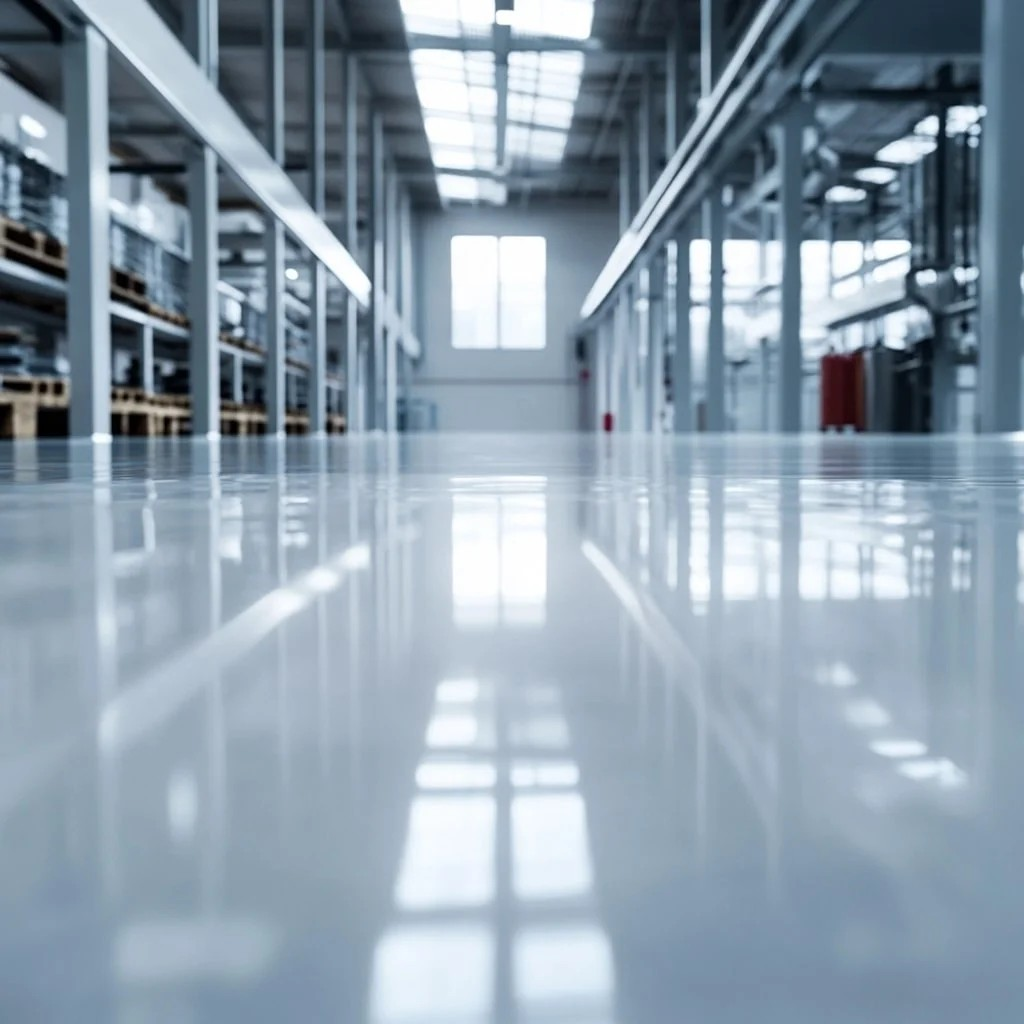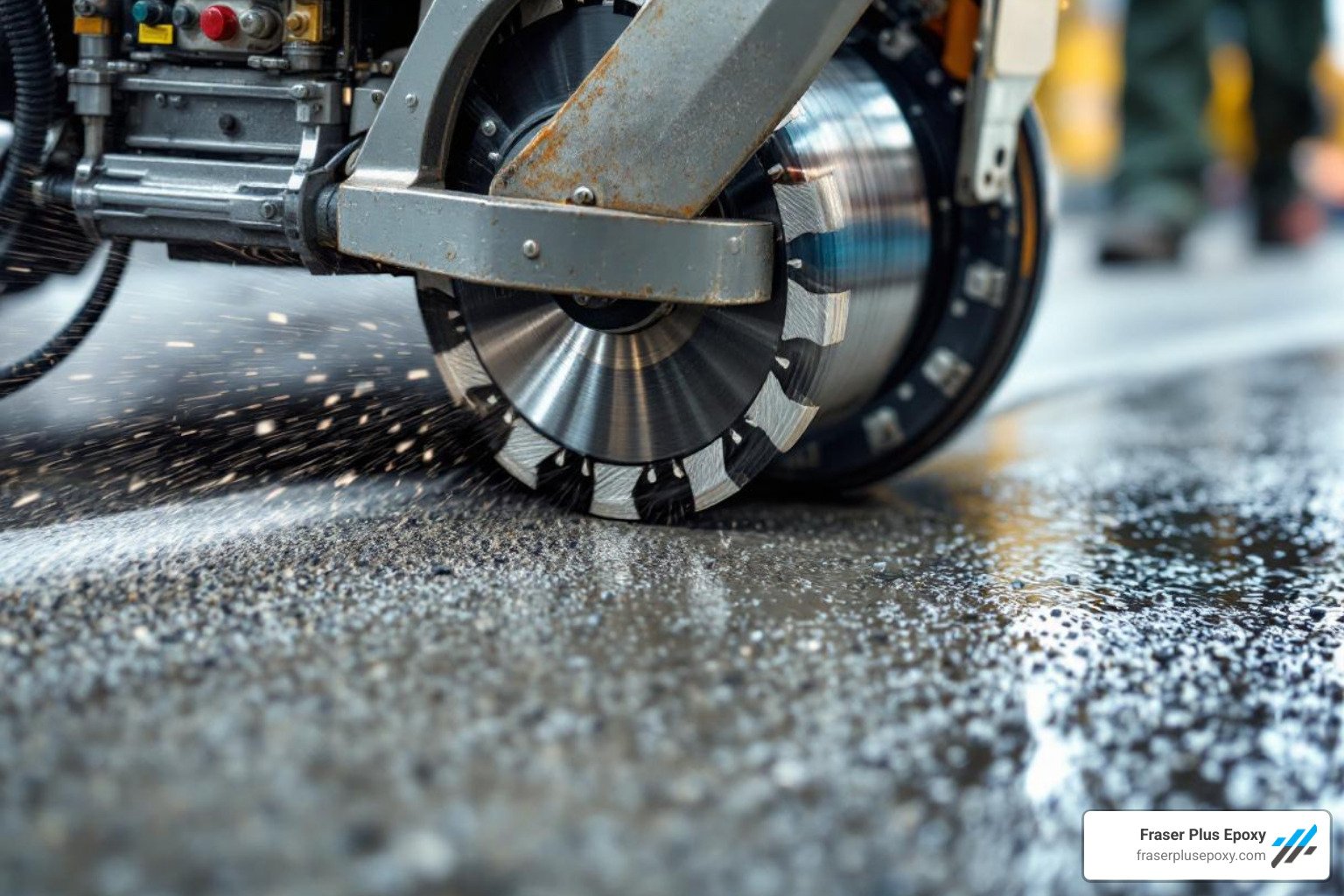Chemical resistant floor coatings are indispensable in industrial, commercial, and laboratory environments where exposure to harsh chemicals, acids, and solvents is routine. At Fraser Plus Epoxy, we specialize in delivering high-performance chemical resistant floor coatings engineered to withstand aggressive chemical exposure while maintaining durability and aesthetic appeal.
1. Meticulous Surface Preparation: The Foundation of Chemical Resistance Floor Coatings
The longevity and chemical resistance of epoxy floor coatings begin with impeccable surface preparation. Concrete substrates must be clean, structurally sound, and profiled to promote optimal adhesion of the coating system.
- Concrete Profiling and Grinding: Mechanical grinding is the industry gold standard for preparing concrete floors. It removes contaminants, laitance, and weak surface layers, creating a roughened profile that enhances epoxy penetration and bonding. Advanced grinding technology can achieve preparation up to 50% faster than traditional methods, ensuring efficient project timelines without compromising quality.
- Moisture Testing and Remediation: Concrete moisture content must be assessed rigorously. Excess moisture leads to coating failure through blistering and delamination. For optimal chemical resistant floor coatings, maintaining substrate moisture levels below 4% is critical to prevent coating failure and ensure long-term durability.
- Surface Cleaning: Post-grinding, the substrate must be free of dust, oils, and chemical residues. Industrial vacuuming and solvent wiping are standard procedures before coating application.
Proper surface preparation is non-negotiable. Skimping at this stage compromises the chemical resistance and durability of the entire system.
2. Polymer Selection: Novolac Epoxy and Polyurethane Hybrids for Superior Resistance
Selecting the right polymer chemistry is paramount to achieving chemical resistance tailored to specific exposure conditions.
- Novolac Epoxy Resins: Novolac epoxies represent the pinnacle of chemical resistance, especially against caustic acids, solvents, and aggressive chemicals. Unlike standard epoxy coatings, Novolac formulations offer exceptional resistance to chemical degradation, making them ideal for chemical plants, laboratories, and manufacturing facilities. Fraser Plus Epoxy integrates Novolac systems for clients requiring uncompromising protection7.
- High-Solids and Polyamide Epoxy Coatings: For environments with moderate chemical exposure, high-build polyamide epoxies provide abrasion resistance combined with chemical protection. Products like ClovaGuard, a polyamide epoxy, deliver a balance of durability and chemical resistance with a low-gloss finish suitable for industrial floors.
- Polyurethane Cementitious Hybrids: These hybrid systems combine the toughness of polyurethane with the chemical resistance of cementitious materials, offering superior mechanical and chemical resistance. They are particularly effective in washdown areas and facilities exposed to aggressive cleaning agents.
Fraser Plus Epoxy’s expertise lies in tailoring polymer systems to client-specific chemical exposure profiles, ensuring the coating’s chemical resistance aligns precisely with operational demands.
3. Installation Best Practices: Ensuring Maximum Performance
Even the highest quality chemical resistant floor coating will fail prematurely without expert installation. Fraser Plus Epoxy follows stringent application protocols:
- Temperature and Humidity Control: Epoxy and polyurethane coatings require controlled environmental conditions during application and curing. Ideal substrate and ambient temperatures range between 15°C and 30°C, with humidity below 85% to prevent curing issues and surface defects.
- Layering and Thickness: Chemical resistance correlates strongly with coating thickness. Fraser Plus Epoxy applies multiple coats to achieve manufacturer-recommended mil thicknesses, typically ranging from 250 to 500 microns for chemical resistant systems. Thicker coatings provide a more robust barrier against chemical penetration and mechanical wear.
- Seamless Application: Seamless coatings prevent chemical ingress through joints or cracks. Our technicians employ roller and squeegee techniques to ensure uniform coverage and eliminate pinholes or voids.
- Post-Application Curing: Proper curing times are critical. Accelerated or insufficient curing compromises chemical resistance. Fraser Plus Epoxy monitors curing closely, ensuring the floor reaches full chemical resistance before exposure.
Fraser Plus Epoxy: Your Trusted Partner for Chemical Resistant Floor Coatings
As industry leaders in Vancouver, Fraser Plus Epoxy combines technical expertise, premium materials, and rigorous application standards to deliver chemical resistant floor coatings that exceed client expectations. Our tailored approach ensures:
- Customized polymer systems matched to chemical exposure profiles
- Advanced surface preparation using state-of-the-art grinding and moisture control
- Expert application guaranteeing seamless, durable, and chemically resistant finishes
- Comprehensive project management minimizing downtime and maximizing ROI
Our reputation in Vancouver’s industrial flooring sector is built on delivering floors that stand the test of time and harsh chemical environments.
Chemical Resistance Floor Coatings | Fraser Plus Epoxy
Maximizing the chemical resistance of floor coatings requires a holistic approach encompassing meticulous surface preparation, precise polymer selection, and expert installation.
Fraser Plus Epoxy’s proven methodologies and technical acumen ensure that your floors in Vancouver, BC, not only resist chemical attack but also deliver long-term durability and safety. Investing in the right chemical resistant floor coating system today protects your facility’s infrastructure and operational continuity for years to come.
For a consultation on chemical resistant floor coatings tailored to your facility’s needs, contact Fraser Plus Epoxy — trusted epoxy flooring experts, not only in Vancouver, but also in Langley, Burnaby, and Surrey.
FAQs
- How long does a chemical resistant epoxy floor coating typically last in industrial environments?
With proper surface preparation and professional installation, chemical resistant epoxy coatings can last 10 to 15 years or more in heavy industrial settings, significantly reducing maintenance and downtime. - Can Fraser Plus Epoxy customize chemical resistant floor coatings for unique industrial chemicals?
Yes, Fraser Plus Epoxy specializes in tailoring epoxy and polyurethane coatings to resist specific chemical exposures, ensuring optimal protection and durability for your facility’s unique needs. - What maintenance is required to preserve the chemical resistance of epoxy floor coatings?
Routine cleaning with non-abrasive, pH-neutral detergents and prompt spill management are essential to maintain the coating’s integrity and chemical resistance over time. - Are Fraser Plus Epoxy’s chemical resistant floor coatings suitable for food processing facilities?
Absolutely. Fraser Plus Epoxy offers coatings that meet stringent hygiene standards, resist chemical cleaners, and provide seamless, non-porous surfaces ideal for food processing environments. - How soon can I resume operations after Fraser Plus Epoxy installs a chemical resistant floor coating?
Typically, light foot traffic is allowed within 24 hours, but full chemical resistance and heavy-duty use usually require 5 to 7 days of curing, depending on the product and environmental conditions.
People Also Ask
- What makes epoxy floor coatings chemically resistant?
Chemical resistance in epoxy floor coatings comes from specialized resin formulations like Novolac epoxies that create a dense, cross-linked polymer matrix impervious to chemical penetration. - Can chemical resistant floor coatings prevent staining and corrosion?
Yes, these coatings form a protective barrier that prevents chemicals from reacting with the concrete substrate, thereby avoiding stains, corrosion, and structural damage. - How do temperature fluctuations affect chemical resistant floor coatings?
High-quality chemical resistant coatings are formulated to withstand temperature variations without cracking or losing adhesion, but extreme fluctuations may require specific polymer blends. - Are chemical resistant floor coatings slip-resistant?
Many chemical resistant coatings can be customized with anti-slip aggregates or textured finishes to enhance safety in wet or spill-prone areas. - Why should I choose Fraser Plus Epoxy for chemical resistant floor coatings in Vancouver?
Fraser Plus Epoxy combines over 20 years of local expertise, premium materials, and meticulous installation techniques to deliver chemical resistant floor coatings that outperform competitors in durability and aesthetics.


